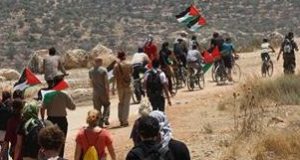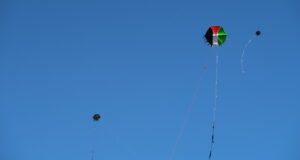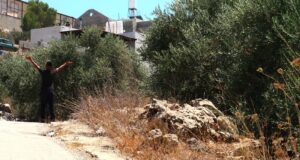by Saif
After filling out papers at the Jordanian border with Palestine, the bus started moving towards the side that is controlled by the Israeli occupation authorities. As much as I missed Palestine, thinking about the process that Israel imposes on Palestinians traveling through the border and the time that I have to spend waiting for permission from the occupation authorities to enter to my land made me feel at home again.
You never know how it will be.
We arrived at the border. Every thing seemed normal. People lined up to register their bags; the electronic screening machine was still there. For the first time I passed these two procedures without any problem. I gave my passport to the checking desk. Less than one minute later I was approached by two Israeli border policemen. Back to the electronic screening machine.
I spent around one hour between being searched and waiting. Then they brought my dad who was crossing the border with me. After they searched him, we were taken to a place to wait. We were there waiting for four hours. Then I was asked to go the *Mokhabarat* (the Israeli secret service) office. I had to wait another hour outside the office. I was taken for 10 minutes of interrogation. They asked about Spain; what am I doing there? How many countries have I traveled to? What kinds of activities does my organization have? What is my role in the organization? I also was asked how can I enjoy my time in Spain while resistance activists are starving in Palestine?
It is really confusing. If we resist they don’t like it. If we stay at home they don’t like it. If we leave Palestine they also don’t like it. After that I was given a notification paper to go for an interview with the Israeli secret service at Huwara military base on the 19th of this month, which was this morning.
I arrived at Huwara at 11 am for the interview. I passed through a very strict search procedure. This time it took two hours to finish the
interrogation. I was asked again about Spain and my work there. I was asked about the work of my parents. “Do you go to parties?” “Do you go out with girls?” “Do you have a girl friend?” “What are your address and phone numbers here and in Spain?” These things cannot threaten Israeli security. I mean, what is the relation between me going out to parties and the security of the Israeli state?!
The questioning moved to a new level this time. I will try to describe the second part of the questioning in this dialogue:
Officer: So you don’t know why you have been asked for this interview.
Me: Not really.
Officer: It is about your previous activities.
Me: What kind of activities. Can you explain please?
Officer: ISM.
Me: What about ISM?
Officer: Before leaving the country you were very active with ISM. I have to say that we consider you one of the extremists in ISM.
Me: What do you mean by saying “extremist”?
Officer: I understand that all of you in ISM are against violence but we consider you one of the extremists in ISM in terms of non-violent confrontational actions. So how many activities have you organized?
Me: I was arrested once.
Officer: So you measure the number of activities with how many times you
get arrested?
Me: I thought this is your way of measuring activities.
Officer: Are you planning to meet them?
Me: They are my friends. Don’t you talk to your friends? I do.
Officer: Are you coming back to Nablus?
Me: I live with my parents in Ramallah.
Officer: Who is the new coordinator in Nablus?
Me: I don’t know. Someone new.
Officer: Did you meet with any Israelis?
Me: Yossi.
Officer: Did he come to visit you?
Me: Yes.
Officer: Are you planning to participate or organize activities?
Me: Not yet.
Officer: So its possible that you will be part of activities.
Me: Everything is possible. If my daily life keeps being so difficult, I will protest against that. And I will resist it.
Officer: I don’t really understand why, but you didn’t tell me the whole truth.
Me: What did I miss?
Officer: You know. And you know that we know everything, so I don’t understand why you don’t tell me everything.
Me: I did answer all your questions. Are you married?
Officer: Yes.
Me: How many kids do you have?
Officer: Three.
Me: It’s a big family, looks like an Arab family.
Officer: Three is not that big. Listen, I want to give you some advice.
Me: Ok, but I have a question.
Officer: What?
Me: Why do you keep hassling me at the border? Every time I pass the border I get stopped.
Officer: It’s nothing personal. We try to check every body. We don’t know what’s going on in the head of each person and so we try to check everybody.
Me: So am I going to be stopped more times? I mean we just talked and so everything should be ok.
Officer: That’s not my work, people on border decide what to do.
Me: So am I going to face more problems? Can you give me a paper that I was at the interview so I can show it at the border?
Officer: You don’t need any papers. And every one is responsible for what they do. So simply leaving the country depends on you. Its your decision. If your name gets registered again in the police or you participate in activities you won’t be able to leave the country.
Me: I see.
Officer: Let me give you some advice: keep away from everything. Spend the days that you have here with your family and friends, away from ISM and all these kinds of activities. Its better for you. And you will have no problems to leave the country. I want to tell you that you are watched and we will know everything you will do.
Me: Did you bug my phones?
Officer: No, we don’t do that. We have people who will tell us what you do and where you go. And so those people will tell us everything about you in the coming days.
Me: So you didn’t bug my phone.
Officer: No we didn’t. So as I said, take care, enjoy your time and remember that we will watch you, so try not to get arrested, you tell the people how to do it in training, stay behind or second line but better not to get arrested. Take care again. Bye.
Me: Bye.
And that was it. I went back to Ramallah. But all the way I kept asking myself about the situation, the significance of our work and our existence as Palestinians. It was very clear for me that besides all that Palestinians fight for in terms of freedom, land, rights and life, we also fight for the recognition of our existence as humans and as Palestinians. And so I understood something very clearly: I resist so I exist.
 International Solidarity Movement Nonviolence. Justice. Freedom.
International Solidarity Movement Nonviolence. Justice. Freedom.



